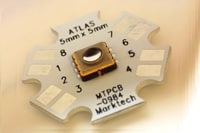NEC Laboratories Europe has developed a hybrid code generator and compiler called NEC Codeqo that simplifies the generation of efficient compute libraries for different processor and hardware accelerator architectures, cutting the time needed to program multi-architecture, high-performance computing (HPC) systems.
Today, hardware accelerators are a standard component of HPC systems but have drastically different programming models. HPC systems consist of many different architectures, requiring programmers to optimize the software code for each architecture separately to achieve system-wide peak performance. As demand for high-performance computing (HPC) continues to grow and becomes more domain-specific, so does the number of HPC systems and hardware accelerators. Roberto Bifulco, Head of Intelligent Software Systems at NEC Laboratories Europe said, “We are witnessing an explosion of new hardware architectures to accelerate workloads with different properties. Being able to quickly adapt software to different and new architectures enables systems to take advantage of the new hardware as soon as it is delivered, saving months of engineers work and energy, thanks to increased efficiency.”
Codeqo technology lets software developers use Codeqo’s GPU-like programming model to program different hardware accelerators for HPC batch processing with one common source code. Using this approach, developers can generate kernels that have top-of-the-line performance across hardware accelerators for different HPC systems, which greatly improves programming efficiency. It also creates more work organization options for software developers who no longer need to specialize in optimizing hardware accelerators for a specific manufacturer; this will improve innovation within the HPC sector.
Machine learning is a large driver of the HPC market, which is forecasted to grow globally at an annual growth rate (CAGR) of approximately 39% from 2021 to 2028. Growth sectors are big data analysis, cloud computing and IOT for real-time predictions. Training machine learning models requires increasingly new architectures; new low-powered devices that operate on the edge are now often used for this task. Codeqo overcomes the problem of developers needing to constantly program for new domain-specific architectures. The compiler not only generates code for different hardware architectures, but also generates it for different batch sizes and different configurations.
Bifulco adds, “A lot of the work in the AI platform domain requires constant change and adaptation. It is a field undergoing fast and continuous changes, and new techniques are being invented as we speak. Reducing the time to transform the new techniques in efficient software implementations allows us to speed up innovation cycles, experimenting and testing new solutions, and moving into production in a shorter amount of time.”
The rapid advancement of new computer technology relies on both domain experts and strong user bases. Applying existing skillsets to new types of technology helps ensure its adoption by overcoming initial bottlenecks caused by the need to constantly upskill. Codeqo is currently being incorporated into SOL, the open-source middleware developed by NEC that enhances neural network workloads and used in NEC’s Vector Engine (VE), NEC SX-Aurora TSUBASA, for accelerated computing. By using Codeqo, SOL can move onto new hardware where manufactures have yet to implement the code needed for hardware devices.






